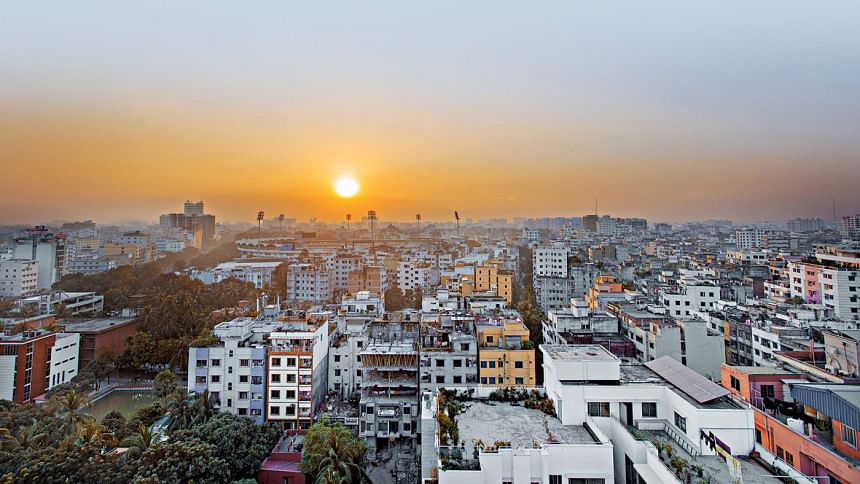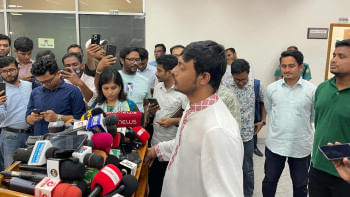“We ensure quality service to safeguard the interests of both buyers and sellers”

The Daily Star (TDS): What was the inspiration behind initiating Bproperty? Could you share the core values, mission, and vision that drive your company's operations?
Mark Nosworthy (MN): Everyone has a right to access trusted real estate solutions. Back in 2015–2016, we identified that no such solution was being provided in the country. So, we thought it was an opportunity to build a business and a brand in Bangladesh, and for this reason, we came into the country.
The core mission and vision are to allow every Bengali to have access to a trusted real estate service. What this means is that if you are a buyer or tenant seeking trusted advice, reliable properties, and secure legal processes, you can confidently engage in finding your home through a trusted service without fear of being defrauded by sellers or developers.
For sellers, it is with a view towards providing more efficient, easier access to buyers. Instead of going through the traditional method of buying, selling, or renting out a property—a sign on a building or an electricity pole— through technology, we make that process more efficient. We allow for properties to be marketed digitally to a much wider set of customers.
Our vision is to make the process more efficient, transparent, and secure for every Bangladeshi. We started operations in Dhaka; we moved into Chittagong and started some early-stage operations in a few other cities as well.
TDS: What are the major areas your company is currently working on?
MN: Our primary focus at the moment is on the secondary market, which consists of ready and available properties for purchase or rent.
Obviously developers today have their own sales teams. They have their own sales processes. But what consumers in the country are increasingly interested in is finding properties that are available today, that are sometimes or typically a little bit cheaper than buying a brand-new property. However, the risks that come with that are how to verify the legality and legal ownership of the property. How do you ensure that you can transfer that property securely?
So that's where our focus really has been because we believe that with land scarcity, developers are unable to build enough property to meet the demands. Therefore, the demand is interested in what we call the secondary market, or readily available property to buy. But there are quite significant challenges with that, which we've been solving for the last few years.
There were two major challenges when we started. One is that there was no property information thus there's no scope for consumers to be able to understand what property options exist. So, we had to create that by collecting information and making them available.
The second thing was salespersons didn't know how to sell or provide service to buyers. They weren't skilled and lacked expertise. We had to work with building the expertise among these individuals so that they can provide the service. You can't educate the market unless your own employees understand what you're trying to do. We worked on changing the mindset of our staff. From day one till today, we've trained almost two to three thousand sales agents in the real estate industry over the last seven to eight years. We've been a very good source of training for real estate sales individuals, and we're very proud of that fact.
The macro situation of the country has its challenges. For an efficient value chain in the real estate sector, it is crucial to improve processes involving every stakeholder, including relevant government authorities and departments—be it RAJUK or housing associations—to transfer properties. Because at the end of the day, if there's friction or slowness in the process, it's just frustrating for everyone.
We're working on our service levels and training. At the same time, the biggest challenge is obtaining digital registers from the government and ensuring faster access to information.

TDS: How have customer preferences and demands changed in recent years, shaping your company's offerings?
MN: When we first came into the country, the buyers typically had been interested in 1,500–1,800 ft² three-bed or four-bed apartments in Bangladesh. That created a real need for smaller apartments. Moreover, since people are traveling a lot more now, they see other property options that exist, especially across Asia, for instance, in Bangkok or Kuala Lumpur — where they can see a 700–800 ft² apartment, a one-bed apartment or a two-bed apartment for about 1,000 square feet.
What we started to observe, and we have been noticing even before COVID, was a real demand for those types of units. The challenge is that the developers haven't been building those types of units, even though that's really where the demand is.
We see consumer demand change towards cheaper and smaller options because they don't need as much space, maybe a bit more of an open-plan design, a very closed, segmented apartment. With this option, you do not need to spend one crore to purchase a property; instead, you may be able to acquire something similar for 70 lakhs, making it significantly more affordable.
I think that's a challenge today. The demand is moving that way increasingly but developers are not building those types of properties—and also not building fast enough to be able to deal with the rising demands.
TDS: How do you evaluate the current state of the real estate market in Bangladesh?
MN: The government changed a few months ago. It has created a challenge as people are still experiencing a little bit of uncertainty regarding future outlook.
Obviously, prior to the government change, there were some headwinds in the industry, such as, increase in raw material prices. But that wasn't an isolated phenomenon in Bangladesh; we saw that across the globe.
Even though people are optimistic about the future, there is uncertainty about how quickly their positive vision will materialize. As a result, many are hesitant to invest. Consequently, the market is slow at the moment, as many individuals are postponing their decisions regarding property purchases.
Additionally, there is the lack of liquidity in banks, making financing difficult. Many property owners were unfortunately looking to sell their property and perhaps leave the country. So, the challenge is that properties that were available for purchase, still remain on the market, but if you are unable to contact the seller, you cannot proceed with the transaction. This is because the necessary signatures and documentation are required for the transfer, and without communication with the seller, the process cannot be completed.
It is a challenging environment. Since a lot of things have changed — change of direction and current uncertainty. All of the aforementioned factors contribute to delays in the process, resulting in a slowdown within the industry.
TDS: How does Bproperty plan to adapt to these challenges?
MN: We are trying to optimize our business processes as well as changing business models a little bit to be able to support the growth and meet the needs of the customers.
We took some steps to stop investing in a few areas which were just the right things for us to do as a business in the short term. So, instead of expanding into other cities, we have decided to stop that expansion for now. Second is looking at where we can optimize our cost base to be in a position to optimize operations for the moment.
I do think that there are still a lot of opportunities to work with agents in the market. Thus, we're looking at changing our business model to engage with the market by including others who aspire to be a real-estate professional perhaps not as a full-timer but working time to time. They can work with us on a freelance or part-time basis. They may know someone interested in buying property, allowing them to act as an agent and earn money. Additionally, we've got the technology solutions to be able to support that.
TDS: How is Bproperty providing its service by addressing the challenge of digital knowledge gap in Bangladesh?
MN: We are an online business, but we also have an offline process. The online site is our shop front but our sales agents and employees meet with customers every day. In our offline process people can come, meet, speak to our agents and management team in order to be in a position to completely understand and trust the processes that we have. Lastly, the actual purchasing the product is done offline.
TDS: How do you foresee the key trends in the next five years in the real estate market?
MN: As people travel and experience things outside the country, they'll bring back this sentiment, "Why can't we have this in Bangladesh? Why can't we do this in Bangladesh?"
People want smaller properties. Also, when you come down to affordability—because of the land scarcity that we have in the country—the only way to be able to offer properties at cheap pricing is to change the layout, the floor plan or the style of the property to suit it. So, honestly I think that's only going to accelerate.
The interview was taken by Saudia Afrin of The Daily Star.

 For all latest news, follow The Daily Star's Google News channel.
For all latest news, follow The Daily Star's Google News channel. 



Comments